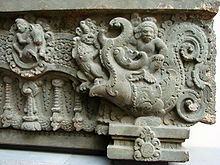- Maruts
-
In Hinduism the Marutas (Sanskrit: मरुत), also known as the Marutagana and sometimes identified with Rudras, are storm deities and sons of Rudra and Diti and attendants of Indra. The number of Maruts varies from two to sixty (three times sixty in RV 8.96.8). They are very violent and aggressive, described as armed with golden weapons i.e. lightning and thunderbolts, as having iron teeth and roaring like lions, as residing in the north, as riding in golden chariots drawn by ruddy horses.
In the Vedic mythology, the Marutas, a troop of young warriors, are Indra's companions. According to French comparative mythologist Georges Dumézil, they are cognate to the Einherjar and the Wild hunt.
According to the Ramayana, the Marutas' mother, Diti, either seven or seven times seven in number, hoped to give birth to a son who would be more powerful than Indra. She remained pregnant for one hundred years in hopes of doing so; Indra prevented it by throwing a thunderbolt at her and splintering the fetus into the many less powerful deities.
See also
Rigveda Mandalas Deities Rivers Rishis Saptarishi (Gritsamada · Vishvamitra · Vamadeva · Atri · Angiras · Bharadvaja · Vasishta)
Categories:- Rigvedic deities
- Hindu gods
- Sky and weather gods
- Sanskrit words and phrases
Wikimedia Foundation. 2010.

